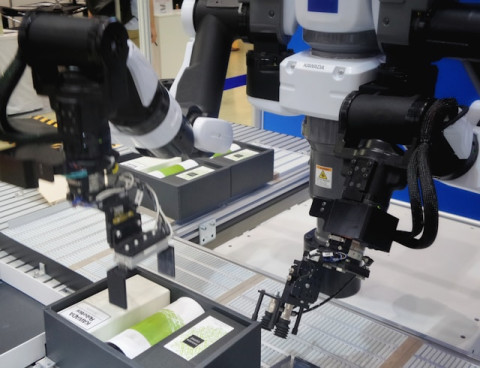ICMM participates in the world's first AI robotics lab to discover new polymer-based materials

The Materials Science Institute of Madrid (ICMM-CSIC), part of the Spanish National Research Council (CSIC), is participating in the DIGIMATER-CM project, which will create the world's first robotics laboratory with Artificial Intelligence to discover new polymer-based materials. This laboratory will be located at the Madrid Institute for Advanced Studies (IMDEA) in Materials, located in Getafe, Madrid.
"One of the project's objectives is to accelerate the development of piezoelectric and magnetoelectric nanocomposites through the implementation of an autonomous laboratory," explains Cristina Pascual, ICMM-CSIC researcher and project coordinator at the center. DIGIMATER-CM is funded by the Government of the Community of Madrid and involves a consortium led by the Polytechnic University of Madrid in collaboration with IMDEA Materials and the Carlos III University of Madrid, the University of Alcalá, and the CSIC's Institute of Polymer Science and Technology.
Regarding the ICMM's role, the researcher emphasizes that her team "will provide our expertise in the development of multifunctional nanocomposites using 3D printing." The researcher explains that the center's assigned tasks include "the synthesis of functional inorganic particles and the functional characterization and validation of multifunctional hybrid nanocomposites developed by the materials acceleration platform."
As the Community of Madrid highlights in a press release, robotic laboratories can accelerate materials design by automating experiments and quickly collecting large amounts of data. This data can be used by AI tools to identify patterns and predict material properties, something that would be impossible to achieve on the same scale by human researchers.
In total, more than 30 people will be involved in this initiative, which also includes four technology-oriented companies as associate partners: Tolsa, Yainfe, ADDvance Manufacturing Technologies, and SecretAligner.
Although robotics laboratories have begun to appear around the world in recent years, their research focuses primarily on the discovery of small molecules and the synthesis of liquid-based materials. "We are certainly not the first to employ this strategy of using highly precise robots that can work 24/7 to generate data for AI tools in materials discovery," explains Javier Llorca, scientific director of IMDEA Materials and coordinator of the DIGIMATER-CM project with the UPM.
"What is truly innovative, however, is that we are going to develop solid materials with realistic microstructures, materials that require industrial processing techniques," adds Llorca. He continues: "Processing liquids is relatively simple. You just mix them and you get a new material. Processing solid materials is much more complicated. You have to use techniques such as injection molding and lamination, work at high temperatures, and optimize nanoparticle dispersion."
From his perspective, "this will be a unique capability, not only in Spain but worldwide, for processing materials for engineering applications."
Instituto de Ciencia de Materiales de Madrid (ICMM)
Sor Juana Ines de la Cruz, 3
Cantoblanco, 28049
Madrid, España
Telephone: (+34) 91 334 90 00
Email: @email
Communication Office: @email

Acknowledge the Severo Ochoa Centres of Excellence program through Grant CEX2024-001445-S/ financiado por MICIU/AEI / 10.13039/501100011033

Contacto | Accesibilidad | Aviso legal | Política de Cookies | Protección de datos
